Evaluating Globalisation's Impact on SASOL's Business Environment
VerifiedAdded on 2023/06/14
|23
|4783
|406
Report
AI Summary
This report provides a comprehensive analysis of the global business environment with a focus on SASOL Limited. It explores the influence of globalisation on organisational governance, leadership, structure, culture, and functions, utilizing McKinsey's 7s model to explain organisational governance and structure. The report also evaluates the impact of ethical and sustainable globalisation on organisational functions and decision-making processes, while identifying key barriers to internationalisation and offering recommendations for overcoming them. Furthermore, it examines the impact of digital technology on globalisation, the challenges and opportunities faced by SASOL due to globalisation, and strategies for mitigating risks. The analysis includes a PESTLE analysis to assess political, economic, social, technological, legal, and environmental factors affecting SASOL's global operations, ultimately aiming to provide insights into achieving sustainable competitive advantage in the international market. Desklib offers additional resources, including past papers and solved assignments, to further assist students in understanding these complex topics.
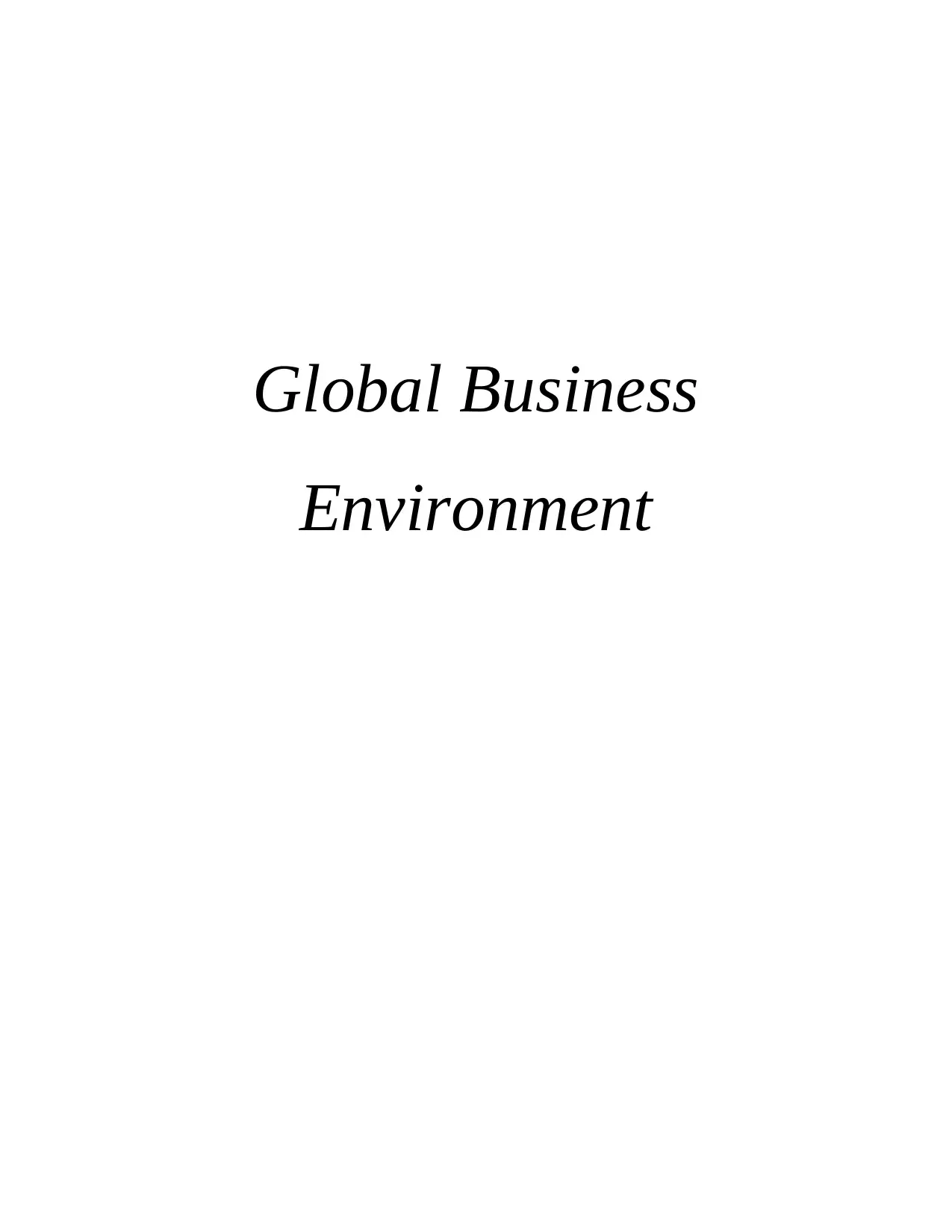
Global Business
Environment
Environment
Paraphrase This Document
Need a fresh take? Get an instant paraphrase of this document with our AI Paraphraser
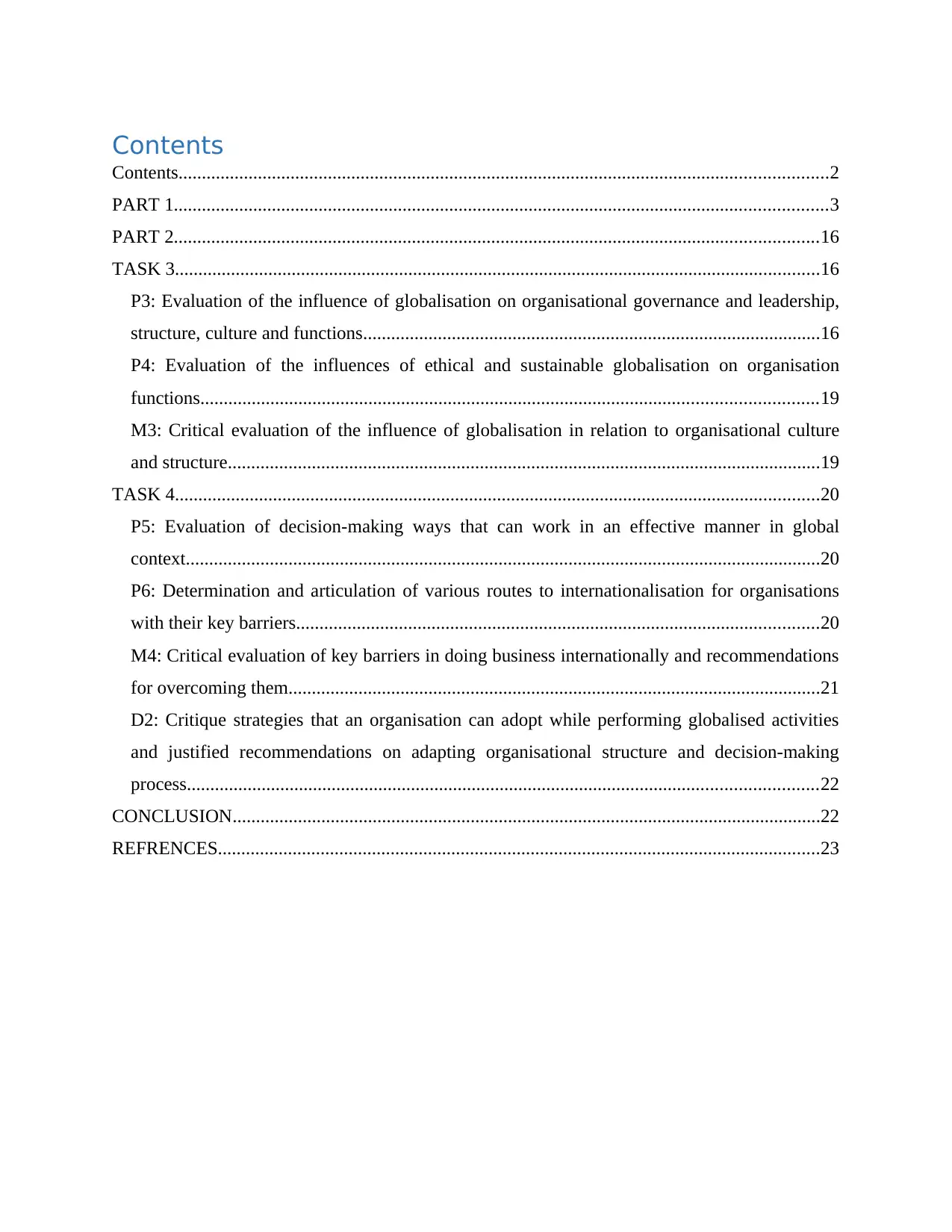
Contents
Contents...........................................................................................................................................2
PART 1............................................................................................................................................3
PART 2..........................................................................................................................................16
TASK 3..........................................................................................................................................16
P3: Evaluation of the influence of globalisation on organisational governance and leadership,
structure, culture and functions..................................................................................................16
P4: Evaluation of the influences of ethical and sustainable globalisation on organisation
functions....................................................................................................................................19
M3: Critical evaluation of the influence of globalisation in relation to organisational culture
and structure...............................................................................................................................19
TASK 4..........................................................................................................................................20
P5: Evaluation of decision-making ways that can work in an effective manner in global
context........................................................................................................................................20
P6: Determination and articulation of various routes to internationalisation for organisations
with their key barriers................................................................................................................20
M4: Critical evaluation of key barriers in doing business internationally and recommendations
for overcoming them..................................................................................................................21
D2: Critique strategies that an organisation can adopt while performing globalised activities
and justified recommendations on adapting organisational structure and decision-making
process.......................................................................................................................................22
CONCLUSION..............................................................................................................................22
REFRENCES.................................................................................................................................23
Contents...........................................................................................................................................2
PART 1............................................................................................................................................3
PART 2..........................................................................................................................................16
TASK 3..........................................................................................................................................16
P3: Evaluation of the influence of globalisation on organisational governance and leadership,
structure, culture and functions..................................................................................................16
P4: Evaluation of the influences of ethical and sustainable globalisation on organisation
functions....................................................................................................................................19
M3: Critical evaluation of the influence of globalisation in relation to organisational culture
and structure...............................................................................................................................19
TASK 4..........................................................................................................................................20
P5: Evaluation of decision-making ways that can work in an effective manner in global
context........................................................................................................................................20
P6: Determination and articulation of various routes to internationalisation for organisations
with their key barriers................................................................................................................20
M4: Critical evaluation of key barriers in doing business internationally and recommendations
for overcoming them..................................................................................................................21
D2: Critique strategies that an organisation can adopt while performing globalised activities
and justified recommendations on adapting organisational structure and decision-making
process.......................................................................................................................................22
CONCLUSION..............................................................................................................................22
REFRENCES.................................................................................................................................23

PART 1
Slide 1:
Slide 1:
⊘ This is a preview!⊘
Do you want full access?
Subscribe today to unlock all pages.

Trusted by 1+ million students worldwide
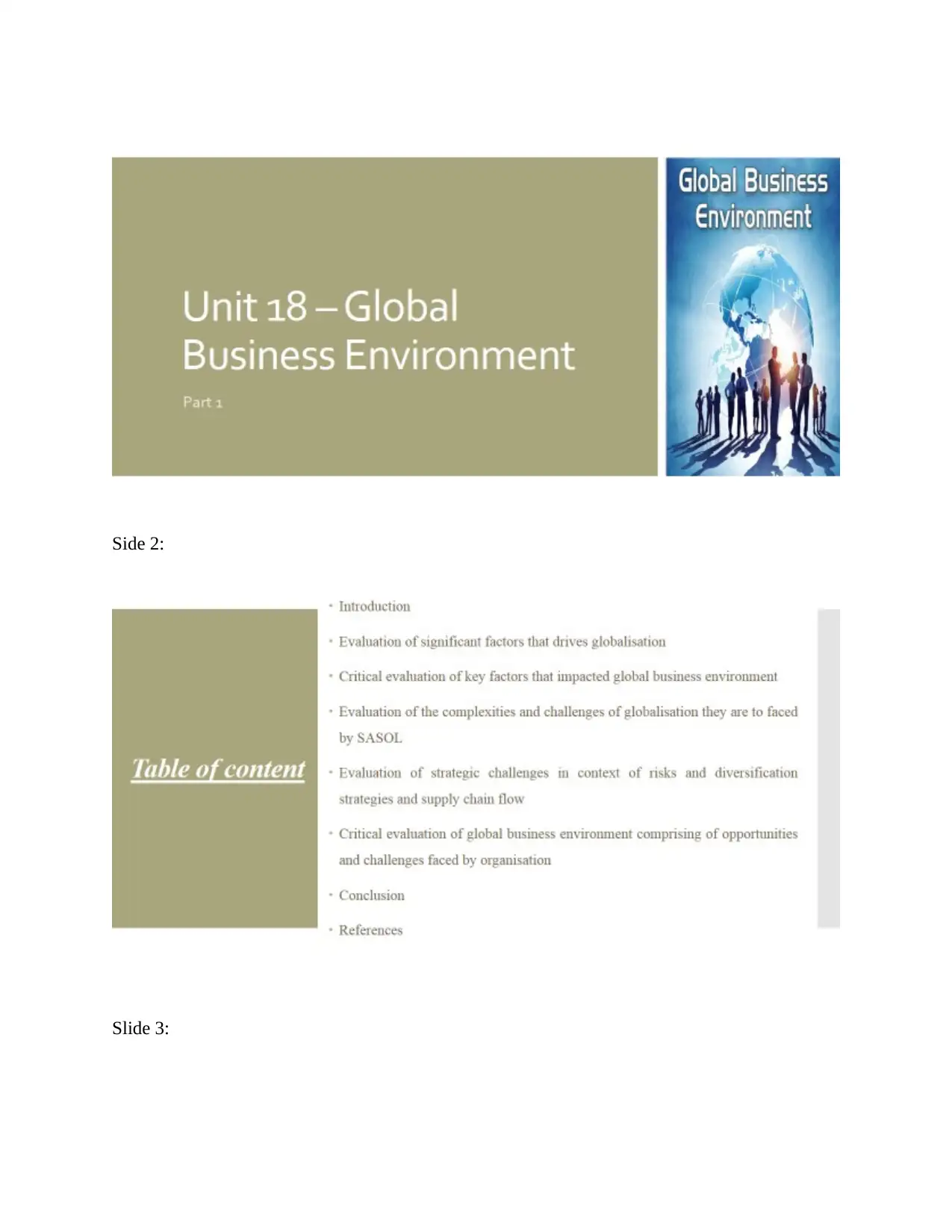
Side 2:
Slide 3:
Slide 3:
Paraphrase This Document
Need a fresh take? Get an instant paraphrase of this document with our AI Paraphraser
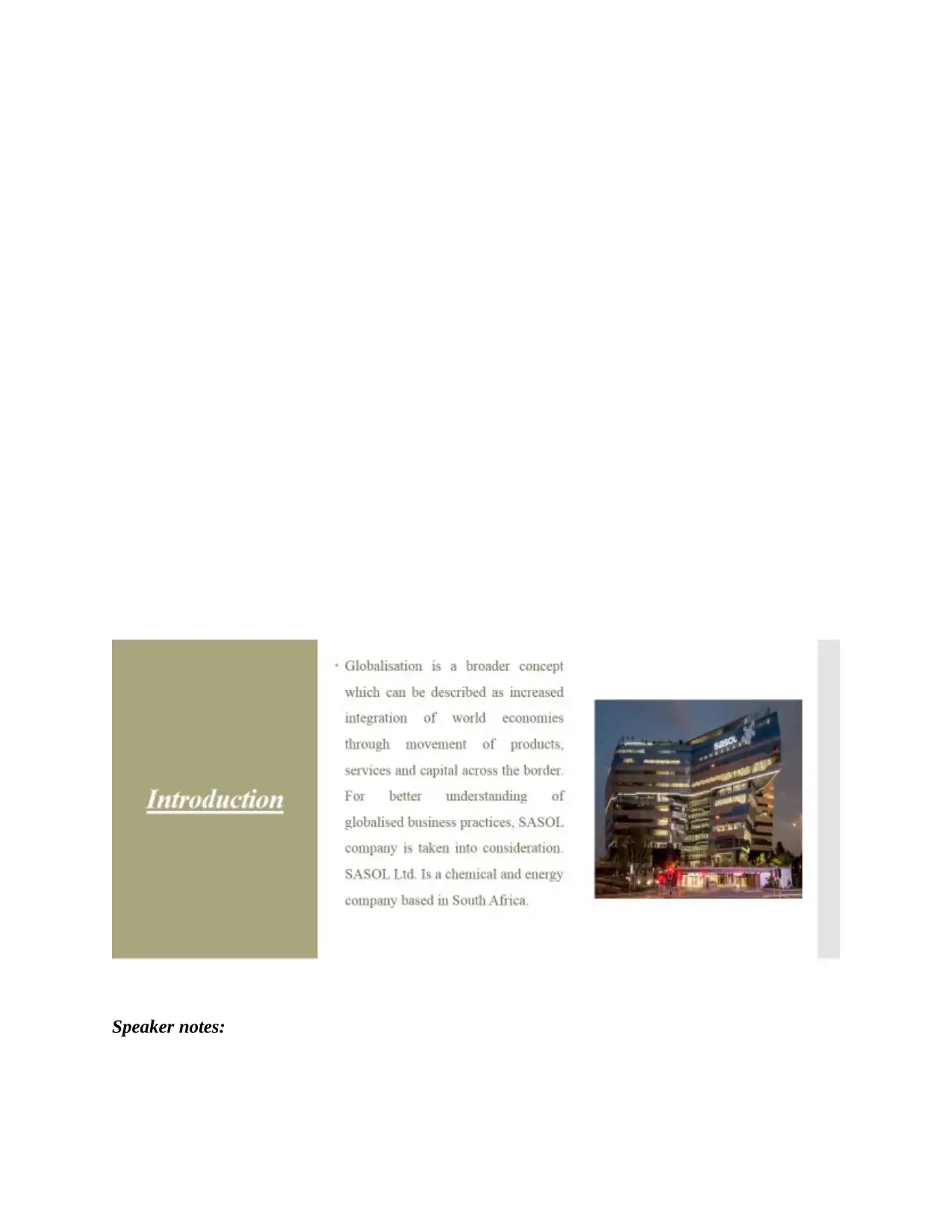
Speaker notes:
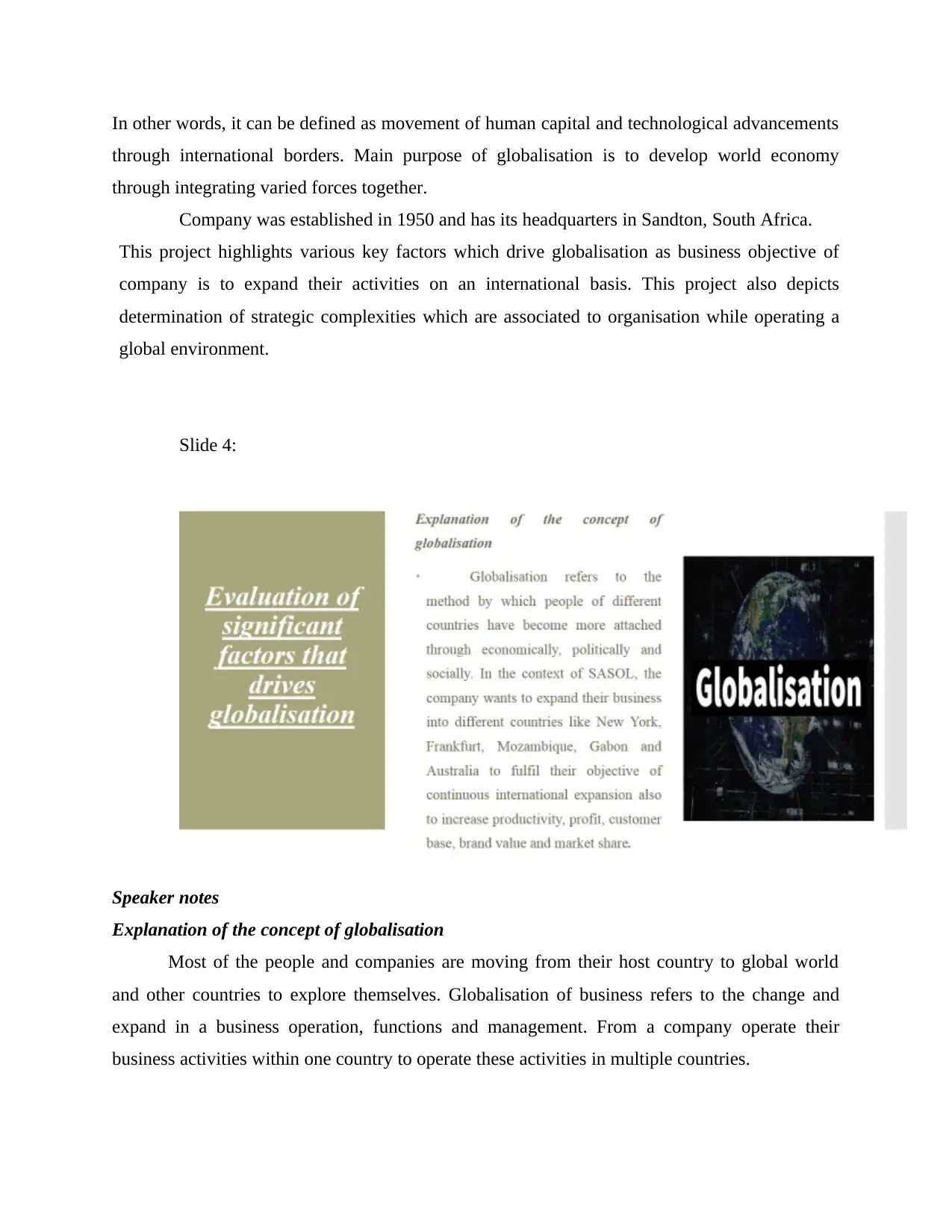
In other words, it can be defined as movement of human capital and technological advancements
through international borders. Main purpose of globalisation is to develop world economy
through integrating varied forces together.
Company was established in 1950 and has its headquarters in Sandton, South Africa.
This project highlights various key factors which drive globalisation as business objective of
company is to expand their activities on an international basis. This project also depicts
determination of strategic complexities which are associated to organisation while operating a
global environment.
Slide 4:
Speaker notes
Explanation of the concept of globalisation
Most of the people and companies are moving from their host country to global world
and other countries to explore themselves. Globalisation of business refers to the change and
expand in a business operation, functions and management. From a company operate their
business activities within one country to operate these activities in multiple countries.
through international borders. Main purpose of globalisation is to develop world economy
through integrating varied forces together.
Company was established in 1950 and has its headquarters in Sandton, South Africa.
This project highlights various key factors which drive globalisation as business objective of
company is to expand their activities on an international basis. This project also depicts
determination of strategic complexities which are associated to organisation while operating a
global environment.
Slide 4:
Speaker notes
Explanation of the concept of globalisation
Most of the people and companies are moving from their host country to global world
and other countries to explore themselves. Globalisation of business refers to the change and
expand in a business operation, functions and management. From a company operate their
business activities within one country to operate these activities in multiple countries.
⊘ This is a preview!⊘
Do you want full access?
Subscribe today to unlock all pages.

Trusted by 1+ million students worldwide
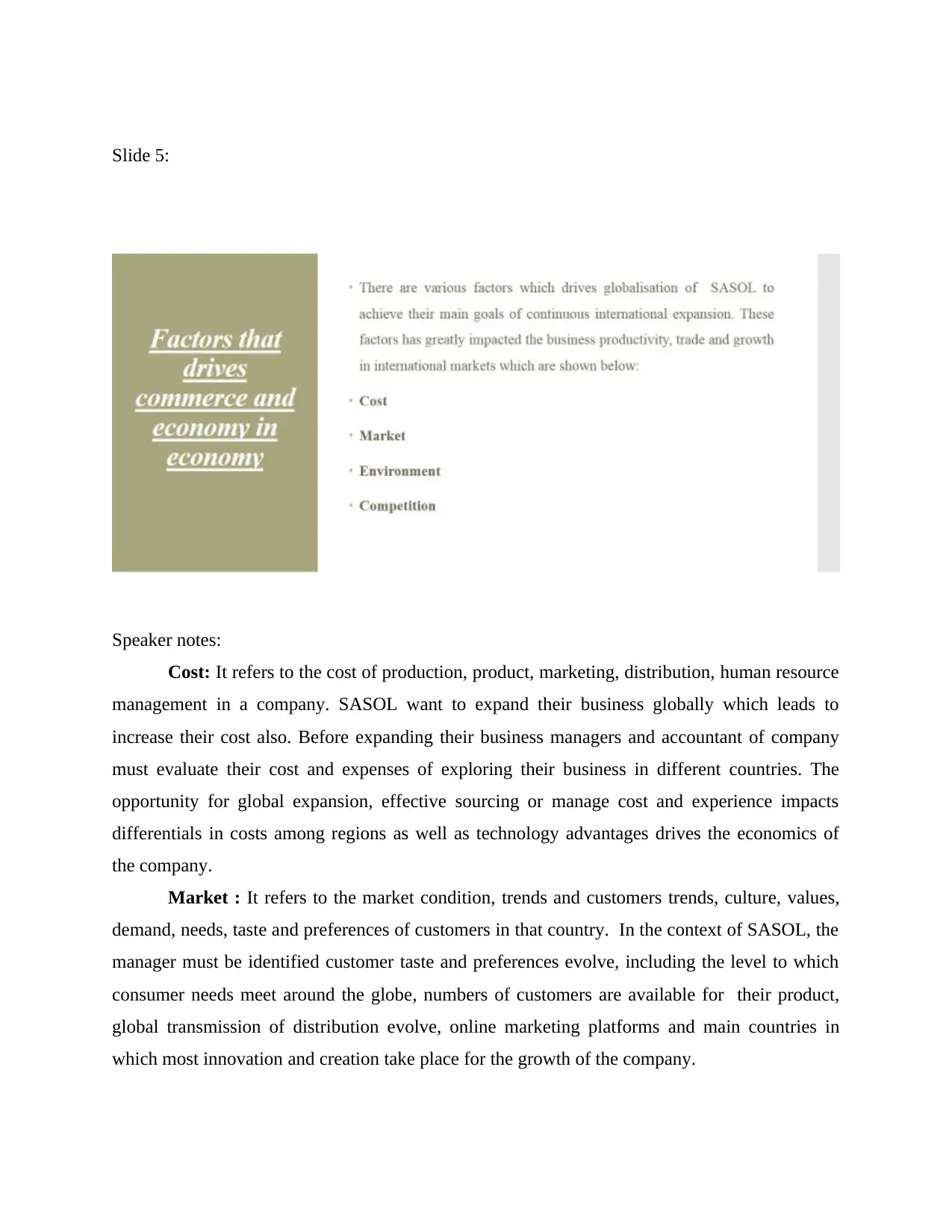
Slide 5:
Speaker notes:
Cost: It refers to the cost of production, product, marketing, distribution, human resource
management in a company. SASOL want to expand their business globally which leads to
increase their cost also. Before expanding their business managers and accountant of company
must evaluate their cost and expenses of exploring their business in different countries. The
opportunity for global expansion, effective sourcing or manage cost and experience impacts
differentials in costs among regions as well as technology advantages drives the economics of
the company.
Market : It refers to the market condition, trends and customers trends, culture, values,
demand, needs, taste and preferences of customers in that country. In the context of SASOL, the
manager must be identified customer taste and preferences evolve, including the level to which
consumer needs meet around the globe, numbers of customers are available for their product,
global transmission of distribution evolve, online marketing platforms and main countries in
which most innovation and creation take place for the growth of the company.
Speaker notes:
Cost: It refers to the cost of production, product, marketing, distribution, human resource
management in a company. SASOL want to expand their business globally which leads to
increase their cost also. Before expanding their business managers and accountant of company
must evaluate their cost and expenses of exploring their business in different countries. The
opportunity for global expansion, effective sourcing or manage cost and experience impacts
differentials in costs among regions as well as technology advantages drives the economics of
the company.
Market : It refers to the market condition, trends and customers trends, culture, values,
demand, needs, taste and preferences of customers in that country. In the context of SASOL, the
manager must be identified customer taste and preferences evolve, including the level to which
consumer needs meet around the globe, numbers of customers are available for their product,
global transmission of distribution evolve, online marketing platforms and main countries in
which most innovation and creation take place for the growth of the company.
Paraphrase This Document
Need a fresh take? Get an instant paraphrase of this document with our AI Paraphraser
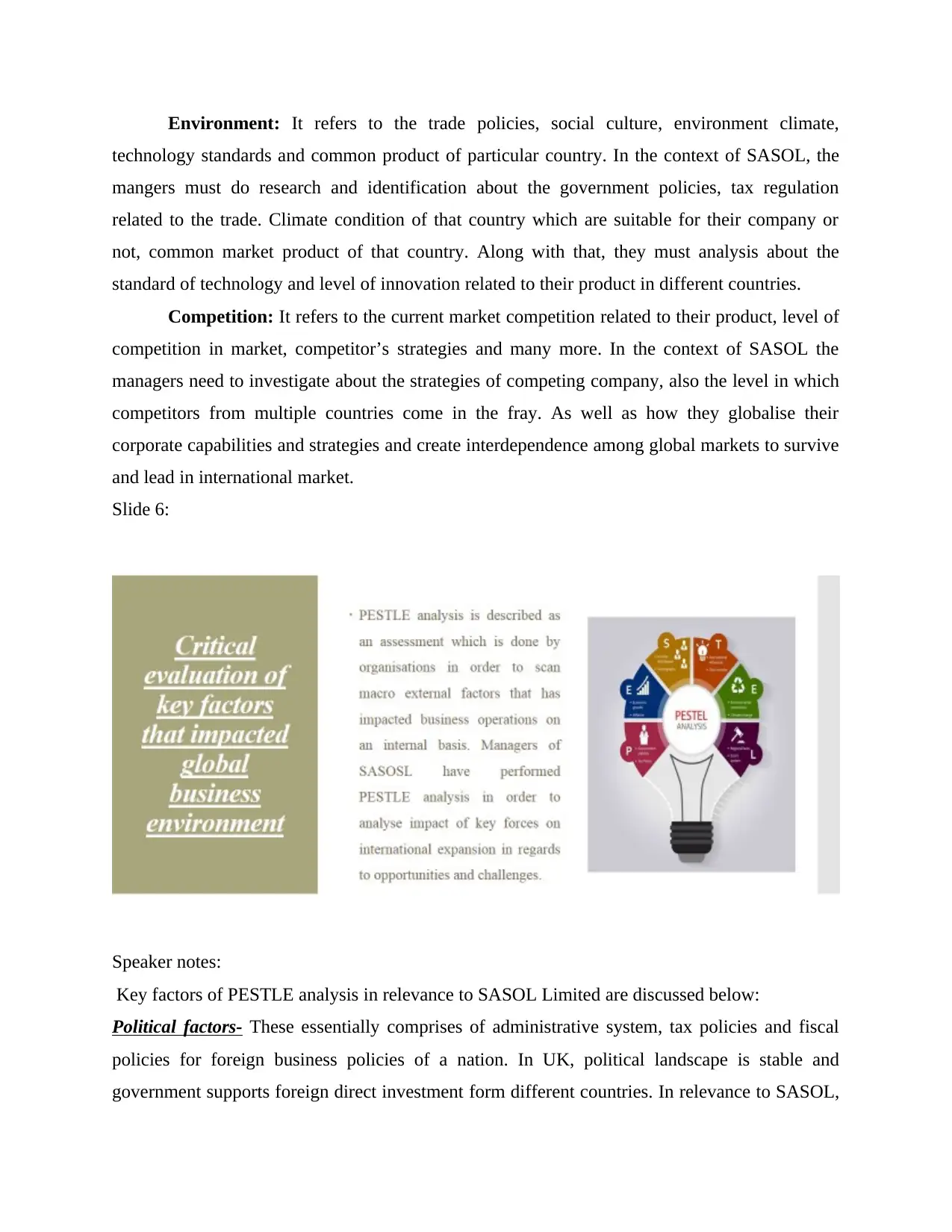
Environment: It refers to the trade policies, social culture, environment climate,
technology standards and common product of particular country. In the context of SASOL, the
mangers must do research and identification about the government policies, tax regulation
related to the trade. Climate condition of that country which are suitable for their company or
not, common market product of that country. Along with that, they must analysis about the
standard of technology and level of innovation related to their product in different countries.
Competition: It refers to the current market competition related to their product, level of
competition in market, competitor’s strategies and many more. In the context of SASOL the
managers need to investigate about the strategies of competing company, also the level in which
competitors from multiple countries come in the fray. As well as how they globalise their
corporate capabilities and strategies and create interdependence among global markets to survive
and lead in international market.
Slide 6:
Speaker notes:
Key factors of PESTLE analysis in relevance to SASOL Limited are discussed below:
Political factors- These essentially comprises of administrative system, tax policies and fiscal
policies for foreign business policies of a nation. In UK, political landscape is stable and
government supports foreign direct investment form different countries. In relevance to SASOL,
technology standards and common product of particular country. In the context of SASOL, the
mangers must do research and identification about the government policies, tax regulation
related to the trade. Climate condition of that country which are suitable for their company or
not, common market product of that country. Along with that, they must analysis about the
standard of technology and level of innovation related to their product in different countries.
Competition: It refers to the current market competition related to their product, level of
competition in market, competitor’s strategies and many more. In the context of SASOL the
managers need to investigate about the strategies of competing company, also the level in which
competitors from multiple countries come in the fray. As well as how they globalise their
corporate capabilities and strategies and create interdependence among global markets to survive
and lead in international market.
Slide 6:
Speaker notes:
Key factors of PESTLE analysis in relevance to SASOL Limited are discussed below:
Political factors- These essentially comprises of administrative system, tax policies and fiscal
policies for foreign business policies of a nation. In UK, political landscape is stable and
government supports foreign direct investment form different countries. In relevance to SASOL,
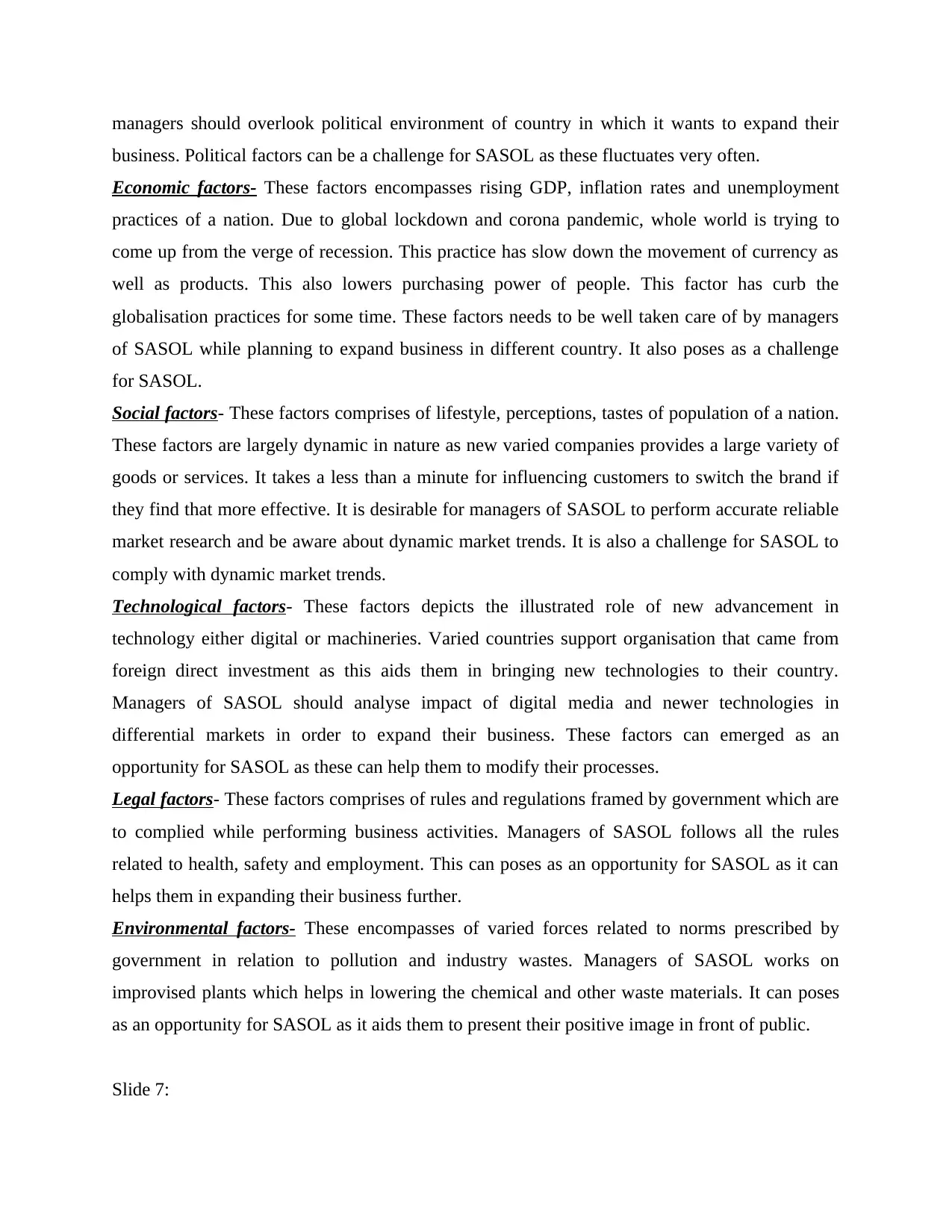
managers should overlook political environment of country in which it wants to expand their
business. Political factors can be a challenge for SASOL as these fluctuates very often.
Economic factors- These factors encompasses rising GDP, inflation rates and unemployment
practices of a nation. Due to global lockdown and corona pandemic, whole world is trying to
come up from the verge of recession. This practice has slow down the movement of currency as
well as products. This also lowers purchasing power of people. This factor has curb the
globalisation practices for some time. These factors needs to be well taken care of by managers
of SASOL while planning to expand business in different country. It also poses as a challenge
for SASOL.
Social factors- These factors comprises of lifestyle, perceptions, tastes of population of a nation.
These factors are largely dynamic in nature as new varied companies provides a large variety of
goods or services. It takes a less than a minute for influencing customers to switch the brand if
they find that more effective. It is desirable for managers of SASOL to perform accurate reliable
market research and be aware about dynamic market trends. It is also a challenge for SASOL to
comply with dynamic market trends.
Technological factors- These factors depicts the illustrated role of new advancement in
technology either digital or machineries. Varied countries support organisation that came from
foreign direct investment as this aids them in bringing new technologies to their country.
Managers of SASOL should analyse impact of digital media and newer technologies in
differential markets in order to expand their business. These factors can emerged as an
opportunity for SASOL as these can help them to modify their processes.
Legal factors- These factors comprises of rules and regulations framed by government which are
to complied while performing business activities. Managers of SASOL follows all the rules
related to health, safety and employment. This can poses as an opportunity for SASOL as it can
helps them in expanding their business further.
Environmental factors- These encompasses of varied forces related to norms prescribed by
government in relation to pollution and industry wastes. Managers of SASOL works on
improvised plants which helps in lowering the chemical and other waste materials. It can poses
as an opportunity for SASOL as it aids them to present their positive image in front of public.
Slide 7:
business. Political factors can be a challenge for SASOL as these fluctuates very often.
Economic factors- These factors encompasses rising GDP, inflation rates and unemployment
practices of a nation. Due to global lockdown and corona pandemic, whole world is trying to
come up from the verge of recession. This practice has slow down the movement of currency as
well as products. This also lowers purchasing power of people. This factor has curb the
globalisation practices for some time. These factors needs to be well taken care of by managers
of SASOL while planning to expand business in different country. It also poses as a challenge
for SASOL.
Social factors- These factors comprises of lifestyle, perceptions, tastes of population of a nation.
These factors are largely dynamic in nature as new varied companies provides a large variety of
goods or services. It takes a less than a minute for influencing customers to switch the brand if
they find that more effective. It is desirable for managers of SASOL to perform accurate reliable
market research and be aware about dynamic market trends. It is also a challenge for SASOL to
comply with dynamic market trends.
Technological factors- These factors depicts the illustrated role of new advancement in
technology either digital or machineries. Varied countries support organisation that came from
foreign direct investment as this aids them in bringing new technologies to their country.
Managers of SASOL should analyse impact of digital media and newer technologies in
differential markets in order to expand their business. These factors can emerged as an
opportunity for SASOL as these can help them to modify their processes.
Legal factors- These factors comprises of rules and regulations framed by government which are
to complied while performing business activities. Managers of SASOL follows all the rules
related to health, safety and employment. This can poses as an opportunity for SASOL as it can
helps them in expanding their business further.
Environmental factors- These encompasses of varied forces related to norms prescribed by
government in relation to pollution and industry wastes. Managers of SASOL works on
improvised plants which helps in lowering the chemical and other waste materials. It can poses
as an opportunity for SASOL as it aids them to present their positive image in front of public.
Slide 7:
⊘ This is a preview!⊘
Do you want full access?
Subscribe today to unlock all pages.

Trusted by 1+ million students worldwide
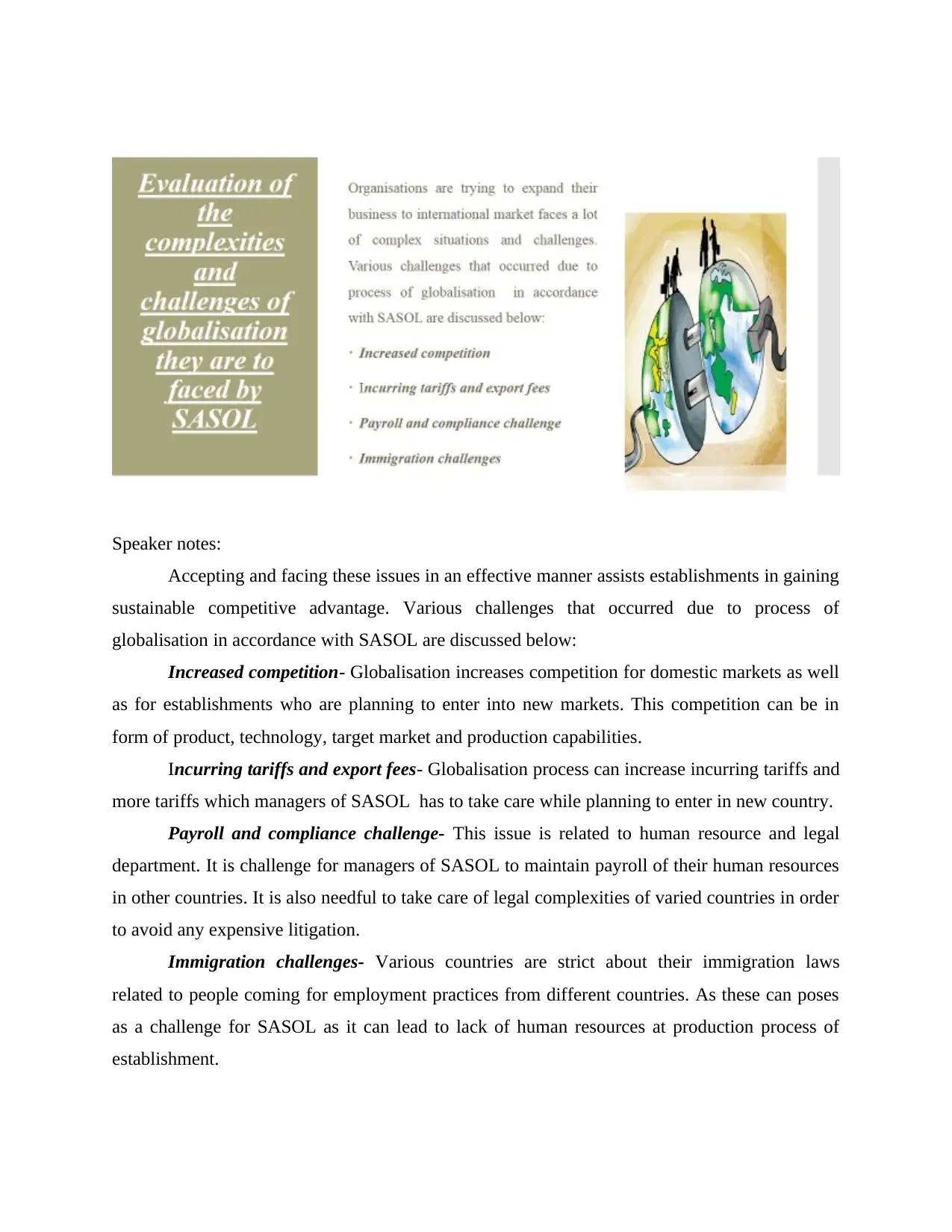
Speaker notes:
Accepting and facing these issues in an effective manner assists establishments in gaining
sustainable competitive advantage. Various challenges that occurred due to process of
globalisation in accordance with SASOL are discussed below:
Increased competition- Globalisation increases competition for domestic markets as well
as for establishments who are planning to enter into new markets. This competition can be in
form of product, technology, target market and production capabilities.
Incurring tariffs and export fees- Globalisation process can increase incurring tariffs and
more tariffs which managers of SASOL has to take care while planning to enter in new country.
Payroll and compliance challenge- This issue is related to human resource and legal
department. It is challenge for managers of SASOL to maintain payroll of their human resources
in other countries. It is also needful to take care of legal complexities of varied countries in order
to avoid any expensive litigation.
Immigration challenges- Various countries are strict about their immigration laws
related to people coming for employment practices from different countries. As these can poses
as a challenge for SASOL as it can lead to lack of human resources at production process of
establishment.
Accepting and facing these issues in an effective manner assists establishments in gaining
sustainable competitive advantage. Various challenges that occurred due to process of
globalisation in accordance with SASOL are discussed below:
Increased competition- Globalisation increases competition for domestic markets as well
as for establishments who are planning to enter into new markets. This competition can be in
form of product, technology, target market and production capabilities.
Incurring tariffs and export fees- Globalisation process can increase incurring tariffs and
more tariffs which managers of SASOL has to take care while planning to enter in new country.
Payroll and compliance challenge- This issue is related to human resource and legal
department. It is challenge for managers of SASOL to maintain payroll of their human resources
in other countries. It is also needful to take care of legal complexities of varied countries in order
to avoid any expensive litigation.
Immigration challenges- Various countries are strict about their immigration laws
related to people coming for employment practices from different countries. As these can poses
as a challenge for SASOL as it can lead to lack of human resources at production process of
establishment.
Paraphrase This Document
Need a fresh take? Get an instant paraphrase of this document with our AI Paraphraser
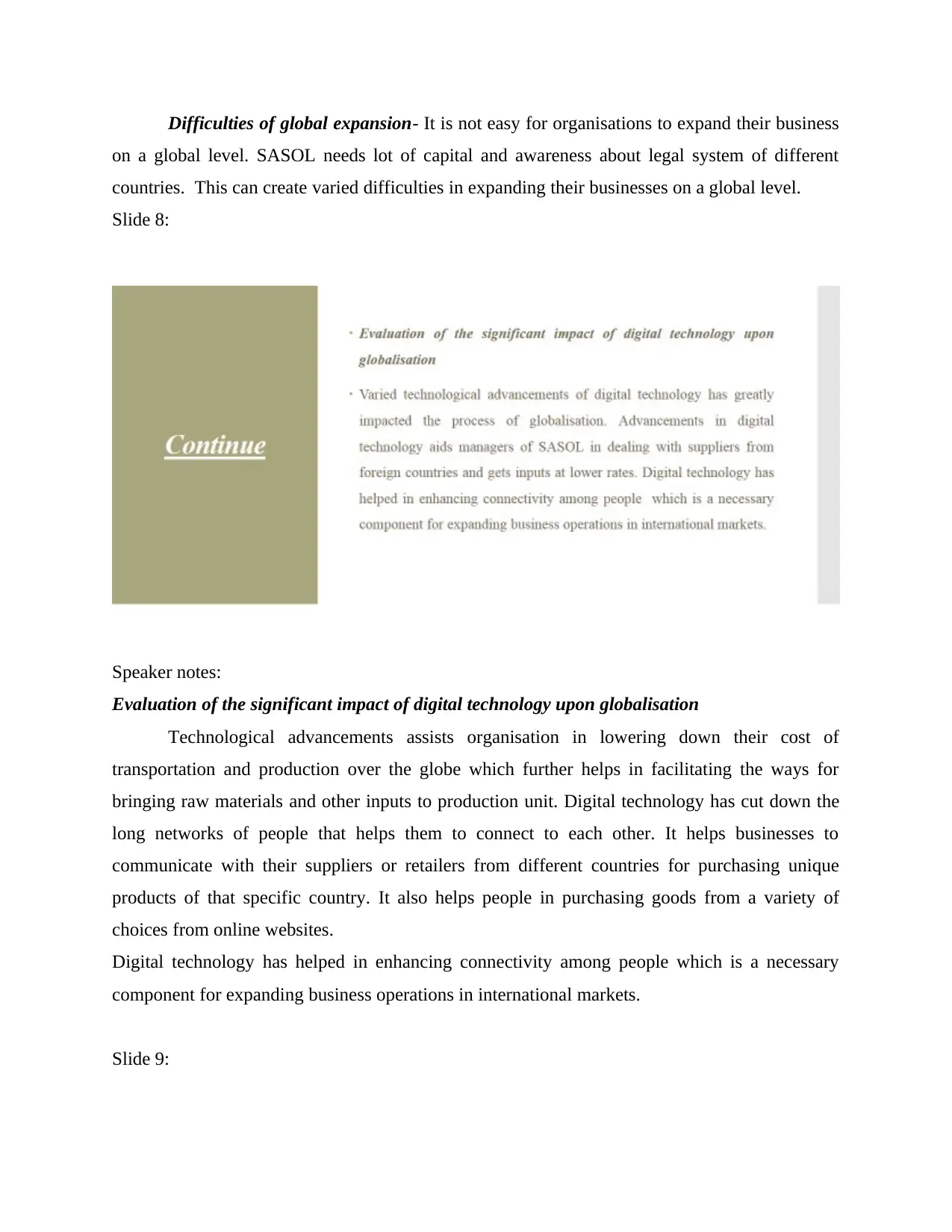
Difficulties of global expansion- It is not easy for organisations to expand their business
on a global level. SASOL needs lot of capital and awareness about legal system of different
countries. This can create varied difficulties in expanding their businesses on a global level.
Slide 8:
Speaker notes:
Evaluation of the significant impact of digital technology upon globalisation
Technological advancements assists organisation in lowering down their cost of
transportation and production over the globe which further helps in facilitating the ways for
bringing raw materials and other inputs to production unit. Digital technology has cut down the
long networks of people that helps them to connect to each other. It helps businesses to
communicate with their suppliers or retailers from different countries for purchasing unique
products of that specific country. It also helps people in purchasing goods from a variety of
choices from online websites.
Digital technology has helped in enhancing connectivity among people which is a necessary
component for expanding business operations in international markets.
Slide 9:
on a global level. SASOL needs lot of capital and awareness about legal system of different
countries. This can create varied difficulties in expanding their businesses on a global level.
Slide 8:
Speaker notes:
Evaluation of the significant impact of digital technology upon globalisation
Technological advancements assists organisation in lowering down their cost of
transportation and production over the globe which further helps in facilitating the ways for
bringing raw materials and other inputs to production unit. Digital technology has cut down the
long networks of people that helps them to connect to each other. It helps businesses to
communicate with their suppliers or retailers from different countries for purchasing unique
products of that specific country. It also helps people in purchasing goods from a variety of
choices from online websites.
Digital technology has helped in enhancing connectivity among people which is a necessary
component for expanding business operations in international markets.
Slide 9:
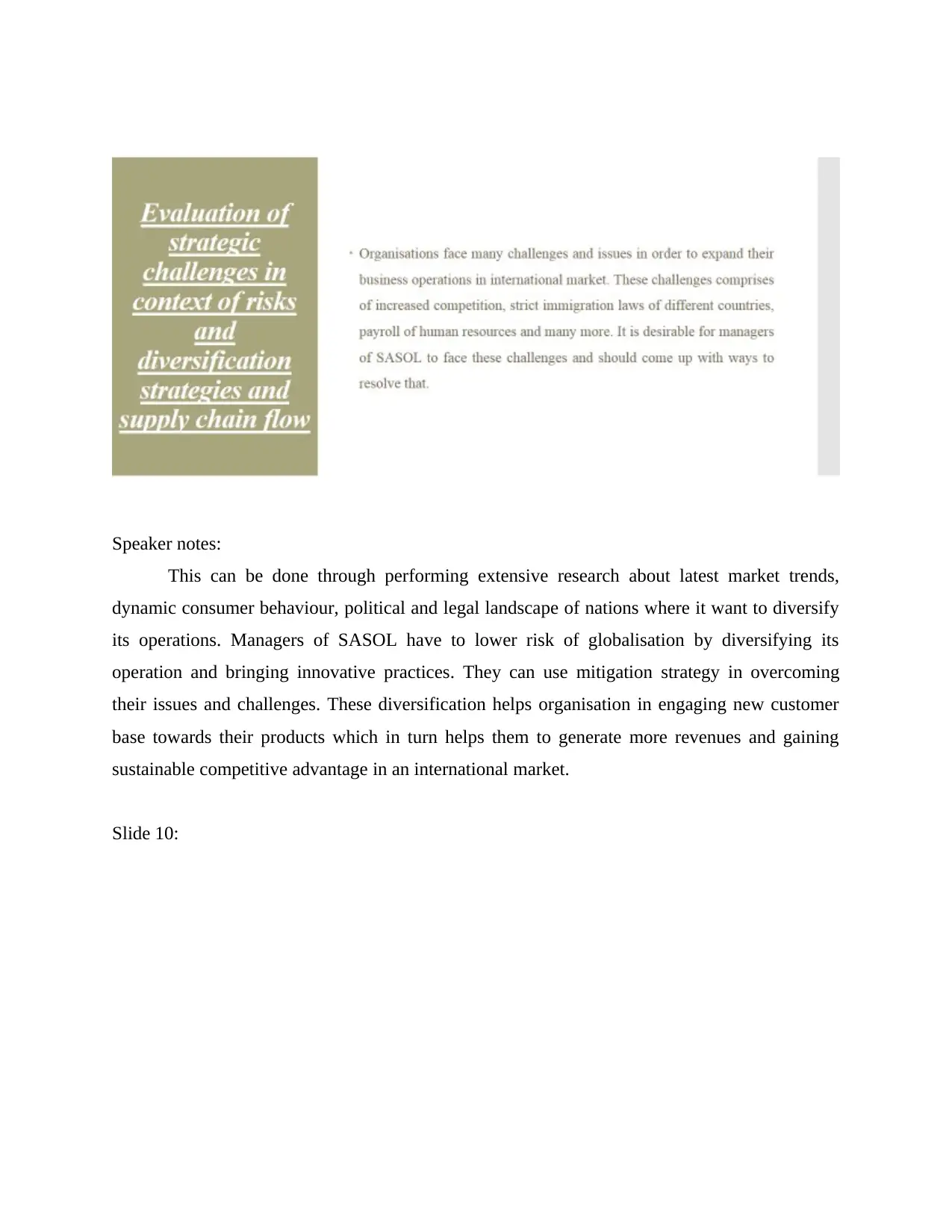
Speaker notes:
This can be done through performing extensive research about latest market trends,
dynamic consumer behaviour, political and legal landscape of nations where it want to diversify
its operations. Managers of SASOL have to lower risk of globalisation by diversifying its
operation and bringing innovative practices. They can use mitigation strategy in overcoming
their issues and challenges. These diversification helps organisation in engaging new customer
base towards their products which in turn helps them to generate more revenues and gaining
sustainable competitive advantage in an international market.
Slide 10:
This can be done through performing extensive research about latest market trends,
dynamic consumer behaviour, political and legal landscape of nations where it want to diversify
its operations. Managers of SASOL have to lower risk of globalisation by diversifying its
operation and bringing innovative practices. They can use mitigation strategy in overcoming
their issues and challenges. These diversification helps organisation in engaging new customer
base towards their products which in turn helps them to generate more revenues and gaining
sustainable competitive advantage in an international market.
Slide 10:
⊘ This is a preview!⊘
Do you want full access?
Subscribe today to unlock all pages.

Trusted by 1+ million students worldwide
1 out of 23
Related Documents
Your All-in-One AI-Powered Toolkit for Academic Success.
+13062052269
info@desklib.com
Available 24*7 on WhatsApp / Email
![[object Object]](/_next/static/media/star-bottom.7253800d.svg)
Unlock your academic potential
Copyright © 2020–2026 A2Z Services. All Rights Reserved. Developed and managed by ZUCOL.


